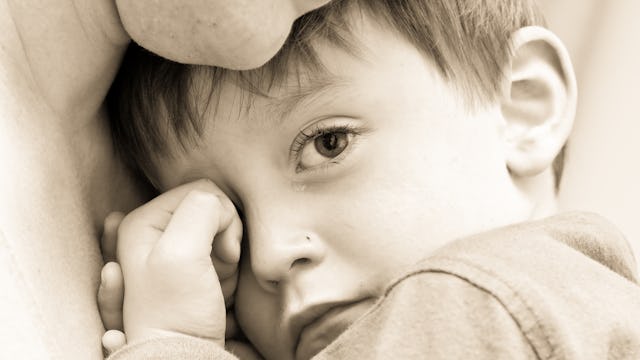I Refuse To 'Toughen Up' My Kids In Preparation For The World

My son Jack went on a field trip to our state museum a few weeks ago. During pickup time, his teacher pulled me aside to tell me they were handed stone shards to carve into arrowheads and Jack received a really big one, and the little girl next to him said, “I hope that there is a big rock like that left for me.”
Without hesitation my son (my son) handed over his shard to the girl. I mention this partly to brag, but also because it reminded me I am raising a child, who (most of the time) when presented with an opportunity to share compassion and understanding, seizes it. He wants to give when he can. He wants to extend kindness when he can. He enjoys lifting people up.
He was compelled to share so his friend would have a special gift and memory, even if it meant he couldn’t have it. And I bet that child will pass it along one day because she knows what it feels like to be the recipient of an unexpected act of kindness.
Now, a part of this is totally my son. He was born with a generous heart. He is sensitive and empathetic, and sometimes he gets his feelings hurt easily, or cries and has trouble telling me what is wrong. For some people, this would be a major clue that he is too soft. That he needs some tough love to get prepared for the “real world.” But here is the thing: I disagree with that sentiment, and I refuse to project it onto my son.
I refuse to try to toughen him up in preparation for the big, bad world.
As a child, I was told quite often to toughen up, to be quiet about certain things — some of them really huge things that you should never be quiet about. I think we have all had an experience where we were told to just deal and had our feelings dismissed. It doesn’t feel good to anyone.
It’s important to me to have a different dialogue with my kids. I am not talking about letting them complain for two days because they didn’t get the biggest piece of cake at the birthday party. I’m talking about letting them be free with their emotions, whether they are hurt or sad, angry or frustrated, happy or excited, because I believe in actually dealing with the feelings you have and processing them in a healthy way. The alternative is stuffing them inside, where feelings have a shelf life and quickly turn into resentment.
We can raise children who are kind, caring, and compassionate. We can teach them expressing themselves doesn’t make them weak.
When we hold the door open, volunteer, donate to charity, or buy lunch for the person sitting alone in a restaurant, our kids see it. They take it all in. They don’t easily forget these things.
And they also take it in when we tell them to just toughen up, stop crying, and shake off an incident that really bothers them. When they come to us with a problem, no matter how small we think it may be, the best thing we can do is acknowledge them and their struggle, then help them through it. We can give them safe spaces to cope with their feelings without repressing them. And just like anything else, the more we practice dealing with emotions instead of putting on our armor, the better we become at it.
Our kids will feel hurt, pain, and go through some really hard shit; it’s the hardest part of being a parent. I want my kids to learn to deal with these situations in a healthy, proactive way. And that will never include wanting them to toughen up to take a sucker punch to the stomach without flinching or teach them behaving “like a man” is what the cool kids do. If I do this, it sends the message there is shame in their feelings and not only will they repress them, those feelings can also resurface in unhealthy ways.
If you are told to stuff your feelings as a child, to toughen up, to not show emotions, or that you shouldn’t feel sad, mad, hurt, or angry regarding certain topics or situations, it becomes a learned behavior, and when you see someone else struggling, you don’t know how to help because you lack the ability to deal with your own feelings — never mind trying to understand someone else’s pain. It inhibits our ability to extend compassion.
When we see kids who want to extend love and kindness, and who truly care about others’ feelings because others have cared about theirs, they are offering the world a very precious gift. And it starts with letting the child next to you have the bigger arrowhead, just because.
This article was originally published on